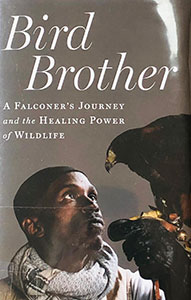No Blacks, No Irish, No Hawks: A Master Falconer Overcomes Racism
Opinion Advocates for ideas and draws conclusions based on the author/producer’s interpretation of facts and data.
 By Brian Kluepfel
By Brian Kluepfel
In our not-so-distant past, landlords, businesses and employers posted signs indicating “No Blacks, No Irish, No Dogs.”
It was clear that in the social hierarchy of the day, Blacks and Irish were considered less than second-class citizens; perhaps subhuman, if we’re to be completely honest.
I was reminded of this slogan the other day while drinking in an Ossining bar. We were all enjoying ourselves, listening to loud heavy metal music, as people of a certain age do, and knocking back some cold ones. As I walked to the jukebox to play another Black Sabbath tune, I overheard somebody say the n-word. I’m not sure who, but I think it was the bartender. They were contrasting metal music with rap. (Maybe they haven’t heard about Eminem or the legion of rappers of all races.)
I didn’t say anything, but I paid my tab and left soon after. It’s not the kind of place I’d hang around in.
It’s not the first time I’ve heard this nonsense in Westchester. I used to frequent a Pleasantville deli. One day one of the counter guys was talking animatedly to a customer and that terrible word came out again. Once again, I said nothing, but I put my items down and left the store.
This was at a time after a young unarmed Black man had been shot and killed by local police, and a Pleasantville police officer was suspended for threatening President Obama from his Facebook account.

For whatever progress we’ve made as a society, as a human race, we still have the destructive and hateful seed of racism deep within us.
Last week I read “Bird Brother: A Falconer’s Journey and the Healing Power of Wildlife” by Rodney Stotts. Stotts grew up on the mean streets of southeast Washington, D.C. Poverty. Single-parent family. Violence and drugs all around at the height of the crack cocaine epidemic.
Stotts fell prey to the lure of the streets and was, for some time, a small-time drug dealer. He carried a firearm and did not envision his life lasting far beyond his early 20s. He did time.
That all took a drastic turn when he signed up for a job with a local environmental organization and became part of a team charged with cleaning the contaminated Anacostia River. His motives for applying for the job were not pure, but that doesn’t matter.
Eventually, the program was successful enough to be chosen to re-introduce Bald Eagles to the area. Stotts, always fascinated with birds of prey – he sometimes cut school to visit the National Zoo in Washington – became engrossed in the eagles’ successful re-population, and through that was introduced to the ancient sport of falconry.
Falconry has been the sport of kings and royals for centuries. When Stotts sought out a sponsor, the first step in becoming an official falconer, he met mostly older, White people, who were often unkind or indifferent to him. One told him, “You people don’t hunt and fly birds. You eat them.” (“Hunt” in falconer’s parlance is taking your bird out and letting it hunt and fly. Again, the not-too-subtle “you people” reference.)
Stotts was angered but unfazed. He eventually found a mentor, and is now a master falconer and has taught his son and many others. He runs a program called Rodney’s Raptors, which educates school groups and others about birds of prey. He is converting a property in the Virginia countryside into an animal rescue, rehabilitation and education center. You should read his story, or check out the National Geographic documentary about his life.
Once, Stotts was showing a hawk to some local children in a park. He was feeding it mice, as one does, and momentarily lost concentration. The hawk lunged and bit his ungloved hand, badly injuring it. He had learned to never lose focus when handling a bird.
We, too, should never lose focus on our humanity. We should not let the ugliness of racism and prejudice come back and bite us. Our ideals should fly as high as Stott’s falcons and hawks.
Ossining resident Brian Kluepfel is an independent journalist whose work has appeared in Lonely Planet travel guides and Westchester Magazine, among other publications. The views in this column are his own.

Examiner Media – Keeping you informed with professionally-reported local news, features, and sports coverage.

